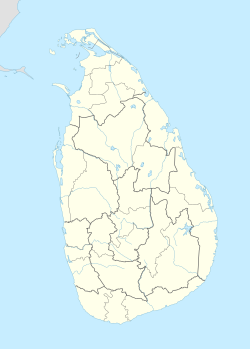
Back كاندي (مدينة) Arabic كاندى ARZ कैन्डी AWA Kandi AZ Канды BE Канди Bulgarian ক্যান্ডি (শ্রীলঙ্কা) Bengali/Bangla Kandy BR Kandy Catalan Kandy (kapital sa lalawigan) CEB
Kandy
| |
|---|---|
| Nickname(s): Nuwara, Senkadagala | |
| Motto(s): Loyal and Free | |
| Coordinates: 7°17′35″N 80°38′06″E / 7.29314°N 80.63502°E | |
| Country | Sri Lanka |
| Province | Central Province |
| District | Kandy District |
| Divisional Secretariat | Kandy Four Gravets and Gangawata Korale Divisional Secretariat |
| Senkadagalapura | 14th century |
| Capital of the Kingdom of Kandy | 1469 |
| Founded by | Senasammata Vikramabahu |
| Government | |
| • Type | Municipal Council |
| • Body | Kandy Municipal Council |
| • Mayor | Kesera Senanayake (UNP) |
| Area | |
• Total | 28.53 km2 (11.02 sq mi) |
| Elevation | 500 m (1,600 ft) |
| Population (2011) | |
• Total | 125,400 |
| • Density | 4,591/km2 (11,890/sq mi) |
| Demonym | Kandyan |
| Time zone | UTC+05:30 (Sri Lanka Time) |
| Postal code | 20000 |
| Area code | 081 |
| Website | Kandy Municipal Council |
Kandy (Sinhala: මහනුවර Mahanuwara, [mahanuʋərə]; Tamil: கண்டி Kandy, [ˈkaɳɖi]) is a major city located in the Central Province of Sri Lanka. It was the last capital of the Sinhalese monarchy from 1469 to 1818, under the Kingdom of Kandy.[1] The city is situated in the midst of hills in the Kandy plateau, which crosses an area of tropical plantations, mainly tea. Kandy is both an administrative and religious city and the capital of the Central Province. Kandy is the home of the Temple of the Tooth Relic (Sri Dalada Maligawa), one of the most sacred places of worship in the Buddhist world. It was declared a World Heritage Site by UNESCO in 1988.[2] Historically the local Buddhist rulers resisted Portuguese, Dutch, and British colonial expansion and occupation.
- ^ "Major Cultural Assets/Archaeological Sites". Department of Archaeology Sri Lanka. Archived from the original on 29 March 2010. Retrieved 24 October 2010.
- ^ "Sacred City of Kandy". UNESCO. Retrieved 1 May 2017.









